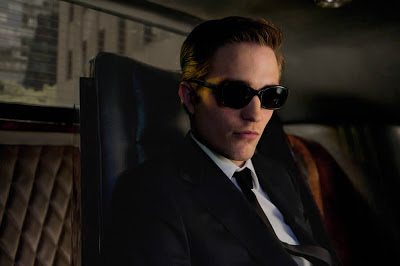Monday 18 June 2012
Cosmopolis (2012, David Cronenberg)
Cosmopolis unfortunately suffers from the same problem as David Cronenberg's A Dangerous Method, a problem in that it's far too expository for its own good. Both films harbour high concepts and insights into the human condition but flatline through their execution; Cronenberg has always been a cerebral filmmaker but with his last two films his departure from the flesh and into the psyche has delivered waning results - the Canadian auteur's strengths have always come from showing, not telling. Some of Cosmopolis' problems may lie in the very make-up of its story but that can hardly be classed as a saving grace.
Here Cronenberg channels Don DeLillo's 2003 novel about Manhattan billionaire Eric Packer travelling across town via limo for a haircut. Does he need a haircut? Probably not, but he wants one and that's a start in understanding the film's heavily laden philosophy on mankind's relationship with wealth and technology. Twilight star Robert Pattinson plays Eric to a tee, his eyes distant, his manor at times awkward but again compulsive and headstrong at others. Here's a man wrestling with who he is and what he means in the world, you can argue that Packer is a man full of hubris and narcissism but really he's self-loathing to the core and Pattinson conveys it convincingly. The film predominantly takes place inside the limo as we witness several meetings between Packer and his associates; each new character's role in the billionaire's life are never revealed but the problem of his business in grave decline is made clear. Each visitor is beckoned to the limo, even a doctor's appointment takes place there, as well as sexual gratification Eric has the world at his finger tips with his car acting as shield from outside dangers such as anti-capatalist riots and personal threats to his life.
Cosmopolis is full of talking heads, while most films are dialogue heavy this involves each entering character to spew forth an extended monologue full of philosophical ramblings. No one in the film comes close to human; interactions feel robotic and disjointed, while that may be the point it displays only one gear and operates on the same level throughout, outstaying its welcome after the first hour. It's clear the film's automaton like players have purpose and direct connections to its conveyed themes of technology and wealth destroying life's essence, but its an element that engrosses as a concept but not in practice. It's incredibly jarring when scenes are played out as if characters are reading DeLillo's words straight from the source, this is just one of many issues the film has in alienating its audience to an alarming degree. Whether this was Cronenberg's choice to make us as indifferent to the characters as they are to each other (at one point Eric seems impressed that he and his newly-wed are maintaining a conversation) is besides the point as we're left outside in the cold while a good film plays inside out of view. Even Howard Shore's atmospheric pulsating score is sparse, never allowing a consistent tone beyond the endless chatter and dead-air.
Cosmopolis oozes with intelligence and ideas, ones that could form a whole evening with discussion and basis for infinite analysis, but here lies the problem - the film is retrospectively engaging but one that refuses to be an engaging experience at all cost. Cronenberg leaves us with plenty to think over but is this enough from the creator of such intellectually visceral films like Videodrome and Naked Lunch? Films that used powerful visual metaphor where mere words weren't enough.
There are some sporadic uses of imagery that sticks in the mind; the anti-capatilist riots involving giant rats is a highlight, also the sudden violence acted on Eric by himself. His excessive wealth and the technological world has left him lifeless and dead inside and there is a sense of tragedy in a man who's only chance to feel is to blast a hole through his hand. This tragedy lies in a larger worldly sense than just Eric himself, everyone in Cosmopolis are archetypal constructs after all. These moments are few and far between and only hint to elements that could have been used for further effect from a filmmaker who never feared to go further than the rest. Whereas A Dangerous Method saw Cronenberg become an interchangeable oddity in a film he was born to make, there is no doubt that only Cronenberg could have made Cosmopolis, the kind of failure only a great director can make.
Labels:
Cosmopolis,
David Cronenberg,
Don DeLillo,
film review,
Review,
Robert Pattinson

